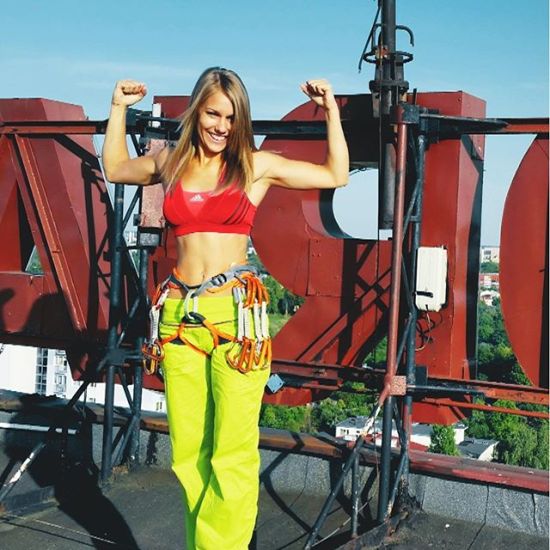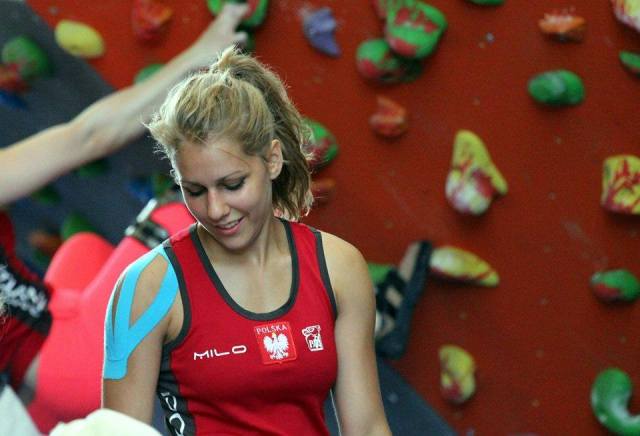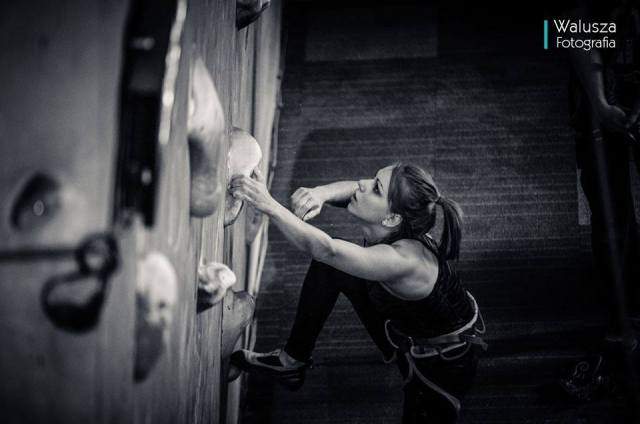The person I’d like to present in my newest interview showed, more than once, that she can rule on a climbing wall. Ola Rudzińska is a three times World Youth Champion (female B, A, junior), the 2014 Bronze Medalist of World Championship and the European Vice-Champion from 2012. If you don’t know what sport climbing is about or how fast one can get to the top of a climbing wall, you must read this interview. If you already know all this, it’s even better, all the more reason for you to read it 😉 You’ll get to know how it all began for Ola, what her favourite place to compete is and which superheroine she would become if she had such a chance.

RT: When I read your posts on the FB page that you run, I have the impression that you don’t need any managers or journalists, because you can perfectly handle covering the competitions you take part in. Have you ever thought about becoming a sports journalist in the future?
Aleksandra Rudzińska: No, I haven’t really thought about it. I don’t feel I’m good enough at it. I still have a lot to learn. I keep learning how to write FB posts, prepare sports coverage and in general run my FB page. All this is a completely new experience, because my FB page has appeared quite recently, in the second half of July, but it’s really nice to hear that I’m good at handling it
My little tradition is starting the interview with the question about the beginning. Do you remember how it all began? I’ve read somewhere that you started from swimming. When did you become interested in climbing? When did you think, “I really want to take it up, to start treating it seriously?”
My climbing adventure began in September 2007, so that was about nine years ago. It’s a great amount of time. I got my feet wet on the climbing wall in the school I was attending at the time. The very idea of climbing was born thanks to my older sister Gosia, who was really good at it. I remember that she would always come home with cups and medals. Once, when she returned from some competition, an idea came to my mind. I thought that I’d like to do the same thing. And that’s how it all began.
And do you remember your first contact with the mountains? For example, some moment from your childhood?
Sure, I do. That was during one of my last training camps for swimmers. Frankly speaking, back then, the mountains didn’t really appeal to me, but the truth is that mountain hiking and climbing artificial climbing walls, or even rock climbing, are two different things. I’m now thinking about coming back to the mountains to get to know them afresh and, who knows, maybe fall in love with them :).
If you take a look at the basic information about sport climbing, you can learn that there are three climbing disciplines called speed climbing, lead climbing and bouldering. Could you decribe, in short, each of them? What do the competitors do? What decides about the final score?
As you’ve mentioned, sport climbing is divided into three kinds:
* lead – competitors climb up the climbing route „leading” the rope up the wall with lead belaying and clipping the belay rope into preplaced equipment attached to bolts on the wall. The length of the routes is about 20-30 metres and their difficulty increases with the rise of the height and the weight of the particular round (preliminary, semi-finals, final). The winner is the climber who reaches the highest point on the wall.
* bouldering – competitors don’t use the rope, crash pads (thick mats) are used for protection. The participants of the competition have to overcome a few separate climbing problems. The amount of the points gained and the number of attempts taken decide about the final rank. Bouldering problems have usually high, often even the highest, level of technical and physical difficulty, unseen in other kinds of indoor climbing competition.
* speed climbing – two competitors climb up dozen metres tall, similar or identical, routes at the same time. The amount of time taken to cover the route decides about the victory or defeat. The best competitors can get to the top of a ten meter wall in 5 seconds time. Speed climbing is a very dynamic kind of climbing, most eagerly watched by fans. It sparks vigorous cheering among the audience and gives great experiences.
Can you say a few words about the equipment and clothes needed in sport climbing?
Whatever kind of indoor climbing we talk about, we always need sportswear, special climbing shoes, a chalk bag and some powdered magnesia carbonate (”chalk” used by climbers). Another piece of equipment you need in lead and speed climbing is a harness. You can usually rent the rest of the things needed at a climbing gym. Of course, the list gets longer with time and a changing level of skills, but I think everyone will figure it out by oneself.
There are some sports disciplines in which properly selected equipment or right shoes can turn the tides, for example help a contestant improve the result by fractions of a second. Can such details matter in your sport? Or does the victory or defeat always come down to your skills?
I think that, after all, sport climbing isn’t on the same level as running or swimming, so the kind of equipment we use doesn’t determine victory or defeat. What matters is always the skills.

Do you have your role models as far as competitors in your sport go? Is there anyone who inspires you?
Actually, every climber is extraordinary and can be inspiring in his or her own way. For me, it’s hard to name one particular authority figure, because you can learn something new and interesting from everyone.
Due to your great achievements in speed climbing, you’re associated mainly with this kind of climbing. Does it give you most fun and satisfaction? What’s so special about it?
What I love most in speed climbing is the adrenaline accompanying every competition. This is what keeps me going. Running up the wall gives me a lot of satisfaction – primarily because I can see my progression and realize that training is effective, I notice its results and make sure that I’m on the right track.
You have a lot of achievements to your credit. In the introduction to this interview I tried to mention at least a few of them. Which achiement was, so far, the most important for you? Which one was the most unexpected?
It’s difficult to pick one particular achievement, because each and every one of them teaches me something new and gives me amazing memories and experiences. As for the most surprising victory, that was in 2012, when for the first time in my life I won a IFSC Climbing World Cup competition. I remember that I didn’t expect that success at all.
You’ve been to China many times, including 2013 when you won an IFSC Climbing World Cup competition in Chongqing. Did you have time for sigthseeing during those stays? Did you have a chance to get to know a little bit of Chinsese culture, the mentality of those people? Which place in China do you have the best memories of?
Yes, of course. We often arrive in a our destination a day or even two before the competition, so we have some time to walk around the city or town, go sightseeing, get to know something about the local culture. Personally, I don’t go a bundle on China and their culture, but I guess it’s a matter of taste. I fondly remember my stay in Shanghai, maybe because it largely resembles a European, rather than Asian, city. At least, this is my opinion.
How popular is indoor climbing in Asia? Is the popularity of this sport there similar as in Poland or can you see the difference as far as the interest of fans goes?
During competitions in Asia, there’s always a full house. People in the audience react very vigorously. I think there’s no point in comparing the popularity of indoor climbing in Poland with the popularity of this sport in any other place in the world, because, unfortunately, not many people in Poland have ever heard of sport climbing. Still, I hope that, with time, it will start to change.
In speed climbing, all the climbing walls at competitions are the same, regardless of the place, right? If so, do you have any places you like best, for example because of the atmosphere during the competitions?
Yes, you’re right. At every competition, the wall, as well as the setting of the holds, is the same. I have my favourite place, though. It’s Chamonix, a little French town situated at the foot of Mont Blanc. It’s a beautiful place. I love it for its magnificent view and the atmosphere at the competitions. I love the local audience :).
Is climbing a sport for everyone? Do you think there’s any age bracket you have to fall within in order to do this sport, not necessarily professionally? Can, let’s say, a 50 year old person in good form give climbing a go and try his or her luck on the wall?
Climbing is a sport for everyone, for children, adults, elderly people. It’s an extraordinary sport and one of the reasons why it’s so special is the fact that everyone can try it, regardless of age and level of training. A lot of people climb just for fun.
What does climbing give you? What have training sessions and competitions taught you?
First of all, climbing has taught me self-discipline, perseverance in pursuing my goals and overcoming my weakness. I can now learn from my failures in order to use them later in my quest for becoming the best. Climbing isn’t only a sport for me, it’s also a kind of relaxation and a way to get away from it all, to take some rest.

In our interview you’ve spoken about the adrenaline that this sport provides. What about your everyday life? When you don’t train or take part in competitions, are you a ball of fire or rather cool, calm and collected?
I’m definitely a ball of fire. I’m always here, there and everywhere. I have itchy feet.
I’m curious if, for example during holidays, you prefer to go to the mountains or rather lie on the beach ad take some rest from thinking about climbing?
Despite everything, I prefer to spend holidays far from climbing, climbing walls and training rigour. However, this doesn’t mean that I go somewhere just to lie on the beach. I like spending time actively, getting to know new places and other cultures, so for my holiday trips I always choose some new, fresh destinations. As for the mountains, this year an idea emerged to go to the mountains, but not in order to climb, but rather to hike ad breathe some fresh mountain air.
What films do you like to watch, what do you like to read, if you have some time for that?
As far as films go, I don’t have one favourite genre. As for the books, I definitely like psychological books best.
And what do you like listening to?
Just as I don’t have my favourite film, I don’t have one favourite band, singer or kind of music. I really like music by Hans Zimmer and Adele’s songs, but, honestly, it all depends on my mood.
The Carnival’s still on. Do you find time to go to parties?
I do sometimes go out with my friends, have some fun. It’s not that if you’re a sportsperson, you immure yourself and just keep waiting for another training session. I lead a normal life, I have my friends. We like to meet from time to time, talk, go out, go somewhere.
And what’s your favourite music when you’re on the tiles?
For me, it’s really hard to answer this question. I think it all depends on the people you party with, not the music.
If we talk about music, let me ask you – do you listen to music during your training sessions or do you prefer when it’s relatively quiet around?
I definitely prefer training with my headphones on. Music keeps me going and helps me to concentrate.
It’s still the beginning of the year. Could you say a few words about the most important competitions that lie ahead in 2016?
The most important event in this season is the World Championship in Paris that will take place in September. As for other competitions I’m preparing for, there will be of course the whole IFSC Climbing World Cup cycle starting in April, the Polish Championship and the Polish Cup competitions.
The Olympic year has recently begun. Climbing is present at the World Games that next year will be organised in Poland, in Wrocław. What about the presence of this sport at the Olympic Games? Reportedly, there’s a chance that it can become a part of their programme in a few years’ time. Is it true?
Yes, there is such a chance, but unfortunately everything’s in the hands of the IOC commission.
“And now for something completely different.” The end of term exams at the university are coming. Do you have a secret formula that could help students survive this time without too many problems?
I guess I don’t. Unfortunately, every year, it’s the most problematic time for me, because it’s really hard to reconcile studying and training sessions. However, I’ve always somehow managed to handle it so far.
They call you „Spider-Woman” and we can say that you already have one superpower. When I watch the videos showing you speeding up the wall, I have the impression that you could easily take part in one of the TV series about superheroes. If you could really become a superheroine and possess superpowers, who would you like to become? What superpowers would you like to get?
A hard question. I’ve never thought about it, but I’d definitely like to be able to fly. And which superhero would I like to be? Maybe someone like Batwoman?
Thank you very much. I wish you you a lot of new achievements :).
Interview by Łukasz Garbol, January – February 2016
As usual, check a few useful links:
Photo 1 by Mateusz Mirosław, photo 2 by A. Kamiński, photo 3 by Walusza Fotografia. All photo copyrights belong to their respective owners.
